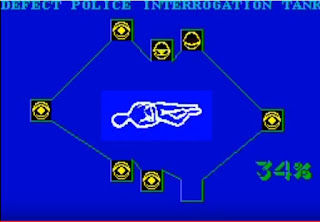The X-Files 1.13 - Beyond The Sea
It's amazing that this show can follow up the worst episode of the season with one of the best. It's a real deliberate and emotional character study, centred on a pair of sensational performances from Gillian Anderson and Brad Dourif, as for the first time Scully becomes the believer and Mulder the sceptic.
The opening sequence is quite surreal and spooky. One moment we are watching Scully in an slightly awkward exchange with her parents about her job and before you know it, she's asleep on the sofa in front of the TV (we've all done it). But wait - Dad's still here - supposedly talking but no sound is coming from his lips. The phone rings and Scully finds out he's actually just died an hour ago. Cue the credits... Okay so perhaps it's not that original a stinger, but it sets the tone for what's to come. Scully is on the back foot, her rational mind and belief in science brought into question and she finds herself inexorably drawn to Boggs - the murder on death row who seemingly can provide her with some closure.
What I find particularly interesting about this scenario is how it to an extent riffs on the very real world of "psychics" and the way that they can (and do) use cold reading techniques to fool the bereaved into thinking they can contact the afterlife. Like my favourite entertainer Derren Brown, I'm fascinated by the "skill" involved in fooling people, even if I do not in any way approve of the reasons.
On one hand Boggs seems to be the typical charlatan, faking the voices and his messages from the dead. Mulder doesn't believe a word of it and even catches him out with a nice bit of fakery of his own. But on the other hand he seems to be at the mercy of these visions and whatever is controlling him. There is certainly more going on here - what exactly is it that Scully sees when she gets these glimpses of her departed father? It's not as if she is mistaking a similar looking man for her dad (as I once did for my own grandfather some time after he had died) - she is really experiencing something unsettling. Boggs knows things that no amount of parlour trickery could pull off.
This switch between the exposure of a con artist and a genuine paranormal experience is a fine line for the episode to walk and the fact that it leaves so much still unanswered, yet at the same time feels complete is down to the great writing and acting. Brad Dourif might be a bit of an expert at playing unstable nasty characters, but he manages to make an unrepentant death row inmate somewhat sympathetic, and I did change my opinion of Boggs as the episode progressed.
One could argue that Scully sees what she wants to see and hears what she wants to hear - even if there is something paranormal at work You could also say that it pushes the concept too far - would she really break down like that in front of a convict despite all the emotional stress she was under? My problem with the episode was more that Milder seemed very out of character. Usually he's the one who's open to believing six impossible things before breakfast, but here his rejection of anything Boggs says feels like the writers trying to generate conflict for conflicts sake.
What's intriguing though is that in the closing moments, Mulder asks why she can't believe in what she's seen, and she says, "I'm afraid to believe.". I'm hoping that this might mean Scully is more open to things in future...
Other thoughts and facts:
- Another joke about Mulder's porn addiction. I guess it's preferable to being caught looking at alien abduction reports










































